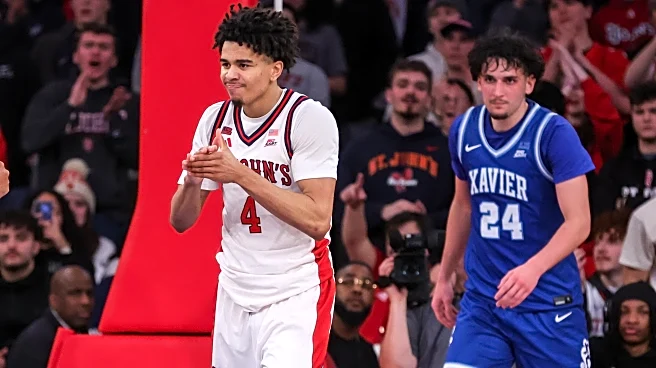What's Happening?
Tyson Fury, the renowned heavyweight boxer, is planning a return to the sport after stepping away earlier this year. Promoter Frank Warren has confirmed that Fury is eager to resume his boxing career, with a potential comeback slated for 2026. While there
is speculation about a possible match with Anthony Joshua, Fury's primary focus is on a third bout with Oleksandr Usyk, the undefeated heavyweight champion. Warren emphasized that Fury is motivated by the prospect of facing Usyk again, following their previous close encounters. The decision on Fury's return and potential opponents will significantly impact the heavyweight division's dynamics.
Why It's Important?
Fury's return to boxing is significant for the sport, particularly the heavyweight division, as it could lead to high-profile matches that attract global attention. A bout with Oleksandr Usyk would be a major event, given Usyk's status as the undisputed heavyweight champion. This could also influence the strategies of other top fighters, including Anthony Joshua, who may seek a tune-up fight before facing Fury. The potential matchups could drive substantial revenue and viewership, benefiting promoters, broadcasters, and the boxing industry at large. Fury's comeback could also reignite interest in heavyweight boxing, drawing in fans and media coverage.
What's Next?
The next steps involve finalizing the details of Fury's return, including the timing and opponent selection. Frank Warren is working to establish a date for Fury's comeback, which will depend on Fury's confirmation and strategic planning. Oleksandr Usyk's decision regarding his next fight will also play a crucial role, as he must choose between facing his mandatory challenger or waiting for a trilogy contest with Fury. The outcome of the Joseph Parker versus Fabio Wardley fight could further influence Usyk's decision, as the winner may challenge Usyk for the WBO title. These developments will shape the future of the heavyweight division.
Beyond the Headlines
Fury's return could have broader implications for the sport, including potential shifts in boxing's cultural and commercial landscape. His comeback might inspire other retired or inactive fighters to reconsider their careers, potentially leading to a resurgence in veteran participation. Additionally, Fury's influence and popularity could drive changes in promotional strategies, with increased focus on high-stakes, narrative-driven matches. The ethical considerations of fighter health and career longevity may also come to the forefront, as stakeholders balance the excitement of major bouts with the well-being of athletes.
















